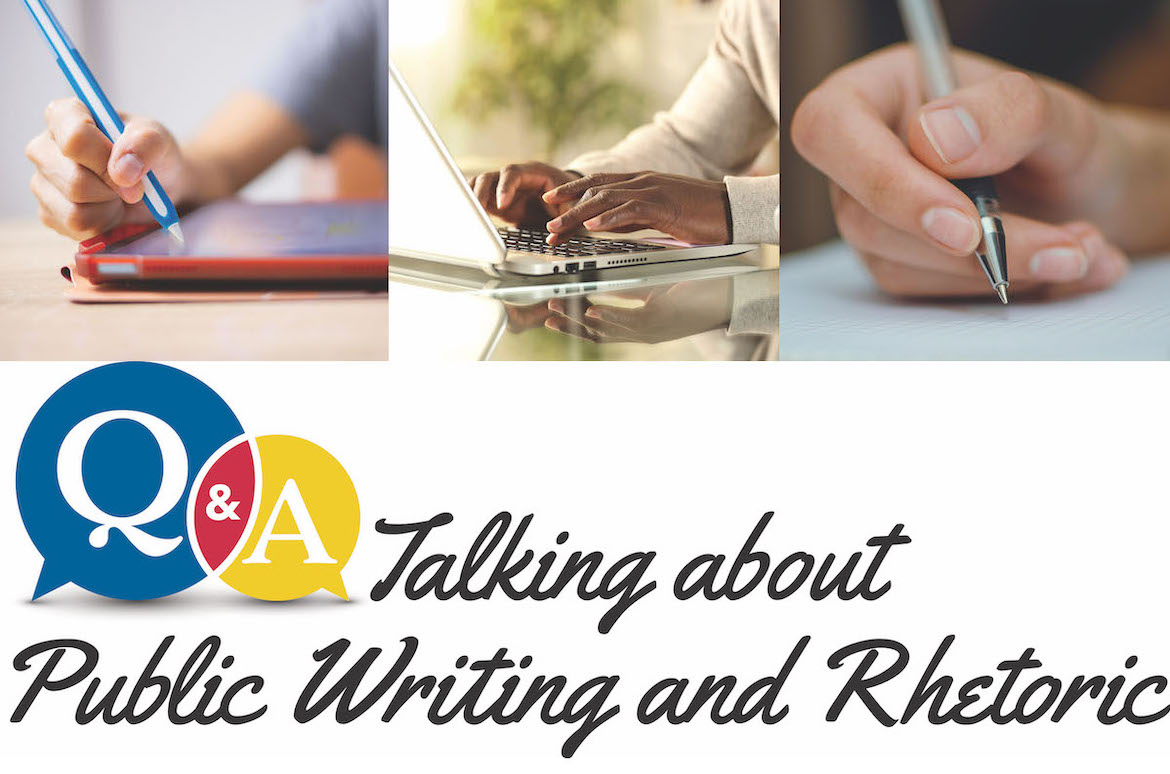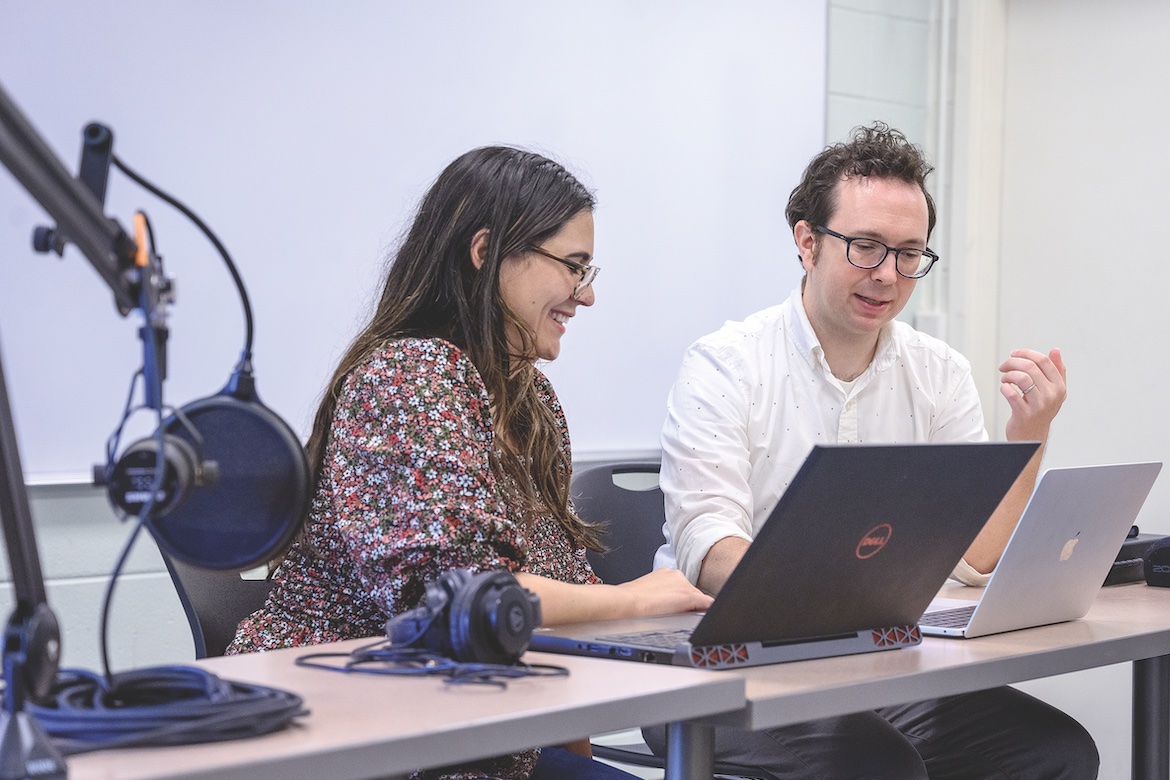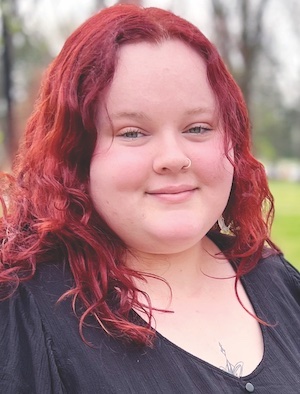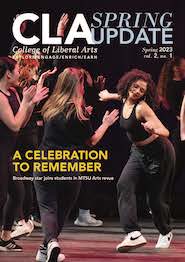
One of MTSU’s most innovative new majors is Public Writing and Rhetoric (PWR), an interdisciplinary undergraduate program in the College of Liberal Arts. The program is directed by Eric Detweiler, an associate professor of English, and has already attracted top-notch students such as Kaelyn Hardin and Haley Jones.
Detweiler, Hardin, and Jones answered a Q&A about this emerging major and how it prepares students to succeed on campus and beyond.
What makes this interdisciplinary program unique?
Detweiler: As far as we can tell from our research, this is the first major like this in Tennessee. The thing that separates it from the concentrations in the English major that we already have is that this is really built around a core set of classes meant to introduce students to a wide range of writing strategies, writing contexts, and genres that they might use for personal and public purposes as well as in professional contexts.
We have excellent concentrations in the English major and a lot of great faculty who are a little bit more focused on literature or creative writing, but PWR allows students the opportunity to move in another direction with the kinds of writing skills that they might want to foster for themselves.
We also provide different kinds of experiences both while they are in college and in terms of where they go after they graduate.

Department of English faculty Eric Detweiler with grad assistant Sami Grayson discussing podcast audio techniques and equipment for his Public Writing and Rhetoric class
What types of careers does PWR prepare students for?
Detweiler: It is not necessarily a major where you are going to be locked into one job when you graduate. It prepares students with the essential skills that they are going to need over the course of their entire careers. If students pursue this major, they will graduate with a strong set of skills that are applicable across many fields—things like technical writing, digital content creation and management, and front-end web development.

Detweiler
They will get experience with a lot of digital content and publications. There are many jobs where you need people who not only know the back end of computer and web design, but who can craft written content for the front-facing side of those websites. Our students will be able to produce documentation about the different processes that a company might use and write that out in a clear way, whether for employees or for customers.
More broadly, PWR students will be prepared to think flexibly about who their audience is and how they can write effectively for that audience. That’s a key part of being successful in the professional world: There are many careers that require a variety of flexible, adaptable, digitally and technologically informed writing skills.
How does studying rhetoric alongside public writing further enhance students’ skills?
Detweiler: When we introduce students to rhetorical strategies, we’re preparing them to organize and present the points that they are trying to make and choose the appropriate tone for their intended audience. Those are really important parts of the writing process. It’s not just about grammar rules or creative expression, though those things matter too.
It’s about actively thinking about who I am writing for, who I am trying to appeal and speak to.
There are a lot of us in the Department of English, in Communication Studies, and other programs across campus who have a strong background in rhetoric as a framework for thinking about how to compose written discourse effectively for a variety of audiences and contexts. And we think that is a really important part of what we’re preparing students to do: to help them think about writing in that way, in addition to some of the other ways that they might be sort of arriving at college thinking about it.
This program sounds exciting for our new freshmen entering this fall! This sounds like a great double major, as well, for students who are further along their academic journeys.
What about students who are already enrolled or transfer in?
Detweiler: This major is definitely designed with those students in mind. We have a lot of transfer students coming to MTSU from various community colleges, and we want this to be a major that they are not boxed out of just because they spend a few years somewhere else. And we think it will pair really well with programs like Journalism, Interactive Media, and Communication Studies.
Writing is a super-important specialized skill that also can partner with a lot of different fields and professions, and we want students to be able to see those synergies and see those potential connections between different majors. Because of that, we designed this as a streamlined major with a pretty flexible set of core requirements—just 36 hours total—that a lot of students can double-major in or transfer into without delaying their graduation date.
Haley, why did you choose PWR?

Jones
Jones: I chose Public Writing and Rhetoric as my major after taking the introductory course with Dr. Detweiler. Despite having been an English major for two years, this class opened up a new side of writing for me. I began to think about writing differently: It was more dynamic, held more power, and was more exciting than I had ever thought. One of the main concepts I have learned through this program is how much writing surrounds us in our daily lives and how much we don’t notice it.
Even previously insignificant things, like the synopsis of a movie on Netflix, have newfound significance for me because I can imagine all the writers behind the scenes. PWR also has helped me stretch my writing skills to other areas that I had not practiced before. Since joining this program only last semester, a whole new world has opened up in which I can write about things I am passionate about while exploring new technology I never would have been brave enough to learn on my own.
I have now learned how to use programs like Adobe InDesign, the programming language HTML, and currently JavaScript.
I never thought I would be learning these things as a writer, but PWR has introduced all of this technology to me and allowed me to gain technical skills that are highly sought after in the job market. The skills I have gained will allow me access to so many different fields from publishing to technical or content writing, and I now feel much more prepared for my career post-graduation.
How about you, Kaelyn? What made the program the clear choice for you?
Hardin: I chose PWR as my major when I told my advisor I was more interested in rhetorical analysis rather than literary analysis and that I wanted to work as an editor after graduation. He introduced PWR as an alternate English major that focused on the writing aspects of English more than the traditional literary aspects, and I have never looked back.
The very first class I took for this major completely changed how I saw and understood writing.
I went from thinking about writing as something that just happens, and you are either good at it or not, to understanding writing as a process and a way of thinking.

Hardin
I learned about rhetorical situations and was able to put names to the concepts that I loved to study. Learning about the foundations of rhetoric and analyzing rhetorical situations and ways of arguing has made me develop and sharpen my critical thinking skills, as well as made me a better communicator.
Classes for this major have opened my mind to types of writing outside the typical college essay. In understanding the foundations and history of Standard Academic English as well as its effect on writers, I have been able to think critically about everyone’s individual writing and have realized that different rhetorical situations force people to write in certain ways that are not always friendly to their own writing, thinking, culture, and otherwise identity.
Not only has all of this knowledge made me a better writer, I genuinely believe it’s made me a better person because I’m able to help people with their writing with understanding and without judgment. And that in turn has not only already helped me be a better Writing Center tutor, but it will greatly benefit me as an editor later in life.
LEARN MORE
Email eric.detweiler@mtsu.edu or visit the Public Writing and Rhetoric program page


COMMENTS ARE OFF THIS POST